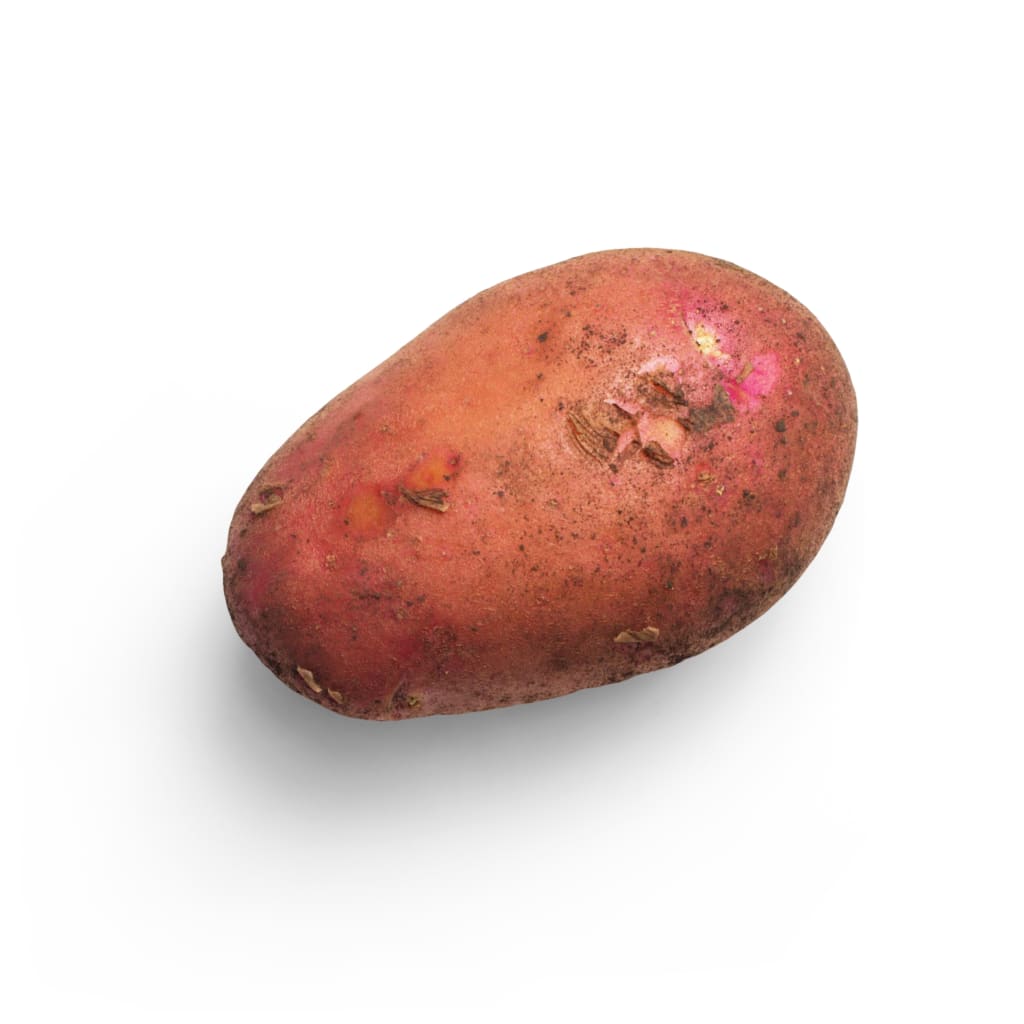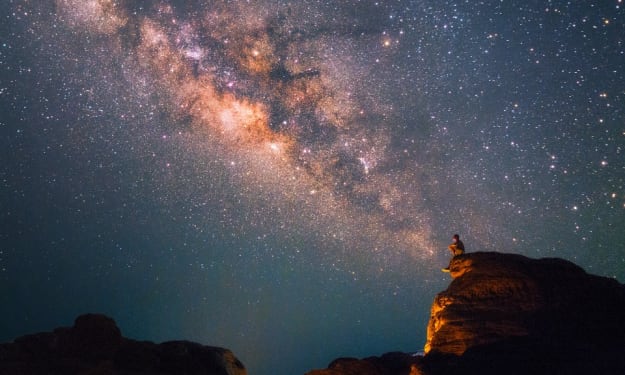Spud
The vindictive virulence of the vegetable

I always knew I would suffer a vegetable-related death. It’s hereditary.
My grandpa had his head replaced by a cabbage after an accident with a produce truck. My great-uncle had quite literally choked on an artichoke. An older cousin had drowned after passing out in a bowl of stewed onions, and more recently my dad had an unfortunate incident with a soup of purple carrots. Apparently some people can have a rare allergy to the pigment in a purple carrot’s skin. Anthocyanin it's called. Perhaps that was why the Dutch liked them orange.
Those aren’t the only stories.
Absurd as it sounds, vegetables have tormented my family for generations. Only the males in my lineage though. I shudder to think of my ancestors during the potato famine. They were from Ireland. Maybe that's where our misfortune started. The original luck of the Irish.
I remember Mum and Dad torturing me into eating vegetables. Their tightened brows concealing the frustration behind their eyes. The frustration every rational parent must feel when it comes to greens. “If you don’t, the vegetable monster might get you,” they would warn. The concept of a vegetable monster, in whatever nightmarish form he took, was terrifying to the innocence of my childhood. I conjured images of tentacles, beady eyes that drooped, a slovenly, slurping, guttural tone announcing its presence. Whatever monster, mythical or not, that took dislike to the dietary preference of a five year old was a creature vain in ethic and misguided in principle. Trapped, I would launch my plate away in an effort to discard the steamed spinach that had gone grey. The limp broccoli, absent of crunch, I would hurl too, eyes darting in all directions due to the idle threats of my so-called loving parents.
After Dad went I didn’t care much about any vegetable monster anymore. If only he had taken this seriously.
I’m not averse to fruits, seeds, or legumes. No. Just vegetables with their malicious intent. But in my decision I was forced to ask perhaps the simplest of questions. What, in fact, is a vegetable?
Basically, a vegetable is considered a plant or part of a plant that can be consumed. A definition too broad. One cannot live solely off salt and meat. And so I concluded that the category of vegetable was a misnomer.
I had to go deeper. Discern the differences.
Botanically, a fruit is fruit if it bears seeds from the ovary of flowering plants. Vegetables, therefore, are plant parts such as roots, stems, leaves and flowers. I would say that vegetables and fruits are the antonyms, or antitheses, of one another.
But this all gets blurred from a culinary perspective. Or even the stage at which a fruit is consumed. It was chaos. So, I questioned, I queried, I surveyed, and slowly built myself a trusted list of plant-related, non-vegetable foods.
I once spent a summer researching various edible grasses, conducting risk analyses to Mum’s concern. I was seven at the time, but the project yielded fascinating results. I concluded that sprouts, grasses or otherwise, may be the most perilous of all vegetables, swiftly lumping them in with the other homicidal foods I had blacklisted. My blacklist was black too. A chalkboard in Mum’s kitchen, now boldly denouncing ‘SPROUTS!’
Sprouts come from seeds. After the embryo begins growing the sprouts are kept warm and moist, the ideal conditions for bacteria to flourish. The seeds could have been contaminated on their original plant by E. coli, Listeria, Bacillus or Salmonella thanks to a passing bird, rat or cat that had the sudden need to defecate. Even more likely if chicken poop was used as fertiliser.
When soaked in water for hours and hours, the microbes reproduce rapidly, growing in number exponentially until reaching dangerous levels. Levels that don’t just raise the eyebrows of public health officials, but induce epidemics. With such a chance of danger I had to take action. I promptly smashed the crop of sprouts growing in my neighbours’ kitchen window using a garden rake and pitchfork. They angrily demanded explanation, frowns lightening after I said ‘chicken poop’ instead of what Mum so often called it. She wasn’t a fan of their birds.
I had to get this right. It was life or death, a war with a food group that held my genetics hostage. I read books, scrolled web pages and forums, making sure I cross-referenced anything vital that might cast doubt on a questioned plant.
All this might sound crazy. At first it was called a phase, then an eccentricity. In high school a disorder, complete with its own acronym which relegated me to that social subset of teens fallen from the edge of popularity. ARFID it’s called. Avoidant and Restrictive Food Intake Disorder. Sometimes I was weird, other times different. It didn’t bother me much. I had a purpose. A purpose of self-preservation. I knew what I was doing. I was surviving.
By the time university came around it wasn’t a disorder. Just a secret.
My first proper girlfriend had invited me for dinner with her parents. They served steak. Steak infused with a marinade of mixed spices. Now spices, one of those categories that I had definitively diversified. Each was different, cinnamon from bark, sumac from berry, turmeric from root. The classifications seemed obvious. But ‘mixed’ spices? Mixed? I felt compelled to ask which ones. The table fielded a barrage of questions relating to the scent and hue of each spicy fleck until I saw her mum clinging more firmly to the cutlery.
A secret it remained.
She called me juvenile. I called her intolerant.
She called me a hypocrite. I called her selfish.
She didn't call me anymore.
I could never bring myself to confess why I shuffled garnishes to the ground, why I so delicately refused any kind of curry, plucked the shallots from burritos, the mint from mojitos. But at a certain point you have to assess your choices. You have to question what is keeping you alone.
Dad’s lingering words still haunt me. “If you don’t, the vegetable monster might get you.” Ironic. I could remember the epitaphs of my relatives, the twinge of fright whenever I neared a green grocer. My dietary preferences were crippling me. I had to turn to that which was safe.
When I graduated with a PhD in Noxious Botany my backyard was a thing of dreams, filled with obscure fruits unheard of by most. I moved to an acreage, converted the old barn. It became a cavernous space with the spoils of Eden. From temperate to tropics, I had rainforest trees once harvested by ancient tribes, berries so sweet they warped the tongue. I had stone fruits so coveted my friends thinly disguised their visits. Strangers begged for seeds and pharmaceutical companies contracted me to grow rare species. I had knowledge, a reputation, and my buried secret.
My fruit barn was popular. It made tourist blogs. I held events, declared a ‘no outside food allowed’ policy, and hired staff who didn’t drink tea. It was working.
A journalist once asked me, with feigned sarcasm, “Why fruit?”
I hesitated, swallowing the sounds of the syllables I desperately wanted her to hear. The words that as a child I would have blurted without thought. But things change. Our fruit grows bigger, hangs heavier. We know what mess it makes when it falls.
“The greatest delight which the fields and woods minister, is the suggestion of an occult relation between man and the vegetable. Emerson. But he said nothing of fruit.”
No word of a curse. Nothing about Dad. Just me once again pretending the grim reaper didn’t reach for me with parsnip fingers.
This brings me to the present, with foreshadowing, and all things final.
I am forty-two today. Douglas Adams had a few things to say about such a number. This is an age where youth relinquishes its vigour and charm has not yet earned its silver lining. On birthdays it is easy to reflect on the nature of circles, opening and closing.
I was strolling my garden, as occurs most mornings, coffee in hand. It comes from seeds after all. And yes, I know exactly what you’re thinking. Bioplastic cups can be manufactured from vegetable products like sugar cane and tapioca. Great observation. But I only use ceramic. Always careful.
I rested on a stone bench, pride diminishing my senses, when I noticed what sat menacingly by my elbow. For there, unseen, a few inches from contact, a single potato chip was laying discarded by some soon to be ex-employee, unaware of the imminent danger they were placing me in.
There it was. Cold. Lifeless. Alone.
I felt a sudden irregular beat in my chest. I think it was Dad knocking from beyond, making sure I was alert. I had neglected the scene I found myself in with its impending sense of doom.
There was nothing else to be done. The chip had to be removed. Swiftly.
With a rolled sleeve I swatted as if a fly had come to rest momentarily. The chip spiralled away as a group of birds to my side fluttered briefly with rounded bellies. I could tell what they had fed on before my arrival.
In any case, one of them fluttered close enough to swipe the chip. The others grunted and hopped in consternation, then finally, chagrin. These were ibis, bin chickens accustomed to hanging around the stain of civilisation, today finding palatable the detritus of a chipper. I have always wondered whether they can taste chicken salt.
The victor took off to my relieved exhale. Threat averted. In hindsight it was easy to process things to inflated meaning.
Meanwhile, rising above me in air currents I could not sense, that ibis circled higher and higher. Clasped firmly in its beak was that bloody chip, stowed patiently while those beyond it slowly digested. This chip, overcooked, bestowed a thicker crunch simply due to its proximity to the edge of the potato, was particularly aerodynamic in design. With very little wind resistance, a more robust exterior than average, and carried to a height well beyond that usually attainable by a tuber, it had become a very real problem.
The risk of an airborne root vegetable was not something I had previously contemplated. Even I wasn’t that paranoid. But that gluttonous bird reached a height of obscurity in the glow of the morning sky. There, with a swift flick of his neck he tried to upend that chip and swallow it whole.
Call it clumsiness, a maw not particularly suited to this snack, a gorged belly, or consequence of the salt content now dehydrating its body, the ominous ibis failed to keep a grip on his chip.
And so the chip plummeted. Accelerating with gravity as Galileo supposed, piercing the air with the refined form of its design. This chip had fate guiding its descent.
Emerson was right. Call it a supernatural pondering, but in my act of reflection for this vegetable, I gazed up. To great error.
That sliver of potato, the curse of my heritage, entered my skull through one of the few fenestra of that bone. The window to the soul, alas, was not shatterproof. It wedged, excuse the pun, in the frontal lobe of my brain, pruning yet another branch from my family tree. I can only wonder at the sight I made with a salty stick of starch protruding from me.
In the end I have to laugh at the joke. The fate that kept me chained to the certainty of my own demise. What had been on my mind for decades had now found a more literal place in my thoughts. Maybe the vegetables were never out to get me. Perhaps it was coincidence. Confirmation bias. An intergenerational series of ridiculously unfortunate events. But my life had literally flashed before my eye, and all I saw was a potato.
About the Creator
Jason Sheehan
I am a conservation biologist, but words and creativity have always been my favourite tools. I like to integrate possibility with fiction in what I write. A spark quickly sets fire to my mind.
Many thanks, and please consider sharing.






Comments
There are no comments for this story
Be the first to respond and start the conversation.